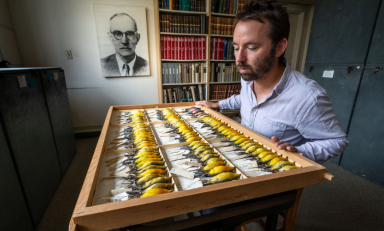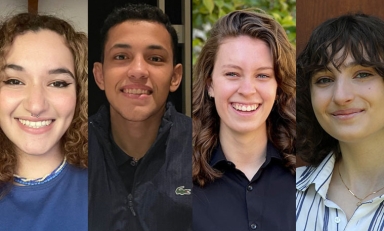Drawing in part on her experience in the White House, prize-winning author, Harvard professor, and human rights advocate Samantha Power offered the Occidental College Class of 2011 five lessons for making a difference in the world in her commencement speech today.
Power, special assistant to President Barack Obama '83 and senior director for multilateral affairs and human rights for the National Security Council, briefly described the sweeping change overtaking the Middle East and North Africa as one of the reasons why making a difference is so important.
"You're graduating at a time when history is on the move in a once-in-a-lifetime kind of way," said Power, who has helped shape the U.S. response to the popular uprisings sweeping the Arab world. "What is happening in the region is a work in progress. It's fragile, it's scary, it's hopeful, and it's immensely brave. These events can leave nobody in doubt that human rights are universal rights ... And every day it's a reminder of the democracy we are so blessed to enjoy in our own country."
So how can members of the Class of 2011 help make a difference? Using illustrations from her own life, Power listed five lessons for the 452 graduates and the more than 3,500 family members and friends who packed Occidental's Remsen Bird Hillside Theater and gave her a standing ovation at the end of her speech.
First, know something about something. "A great scientist put it this way: ‘Chance favors only the prepared mind,'" Power said. "You've laid the perfect foundation on which to launch your life. But going forward you have to build on that base and add knowledge. ... The more you continue to learn, the more ready you will be to take advantage of the opportunities that creep up on you."
Second, don't compare your insides to someone's outsides. As a new White House staffer following the 2008 election, Power said she thought " everyone around me had purposeful, directed strides, while I staggered around, bewildered by the bureaucracy." Armed with a White House map printed out from the Washington Post website, Power said she got lost on her way to the Oval Office and was late to her first meeting with the president. Since then, she has learned where the Oval Office is, "and every one of my colleagues has told me a version of the story I've just told you. ... Life is not about mastering uncertainty, it's about channeling it."
Third, know that failure is a sign of profound success. "One of the greatest dangers of life after college is making certainty of success a prerequisite of starting something new," she said. "Winston Churchill once said that success is the ability to go from one failure to another with no loss of enthusiasm. I can say from experience that in fact failure is not fun, and you can be forgiven for failing in your enthusiasm. However, failing to fail is a sign that you aren't yet testing the limits of what you're capable of."
Fourth, don't script it, live it. "You have three tools that will carry you if you listen to them: your compass, your values, and your gut. It turns out if [they] don't like what you end up doing, I promise you they will not keep quiet," Power said. "If you start to feel that tug, try to expose yourself to places, issues, and people outside your comfort zone. Try, if you can, to remember the sense of potential you feel today. Try to remember the millions of people who would give anything to have the kind of college experience you have had."
Fifth, in whatever you do, try to be fully present. "You have to be all in. This means leaving your technology behind occasionally, and listening to a friend without half of your brain being preoccupied with longing for the red light on your Blackberry."
Power was presented with an honorary doctorate of humane letters, one of five honorary degrees bestowed during the three-hour ceremony. Also presented with honorary degrees were Jean-Lou Chameau, president of the California Institute of Technology; John Gray, the recently retired president and CEO of the Autry National Center; Wahid Hamid '82, business executive and vice chair of the American Pakistan Foundation; and Henry Tang, chief secretary for administration of Hong Kong.
The international orientation of many of the honorary degree recipients reflected a global theme of Occidental's 2010-11 academic year, a year that began with a celebration of the 25th anniversary of Occidental's United Nations program, one of the few of its kind available to undergraduate students in the United States.



